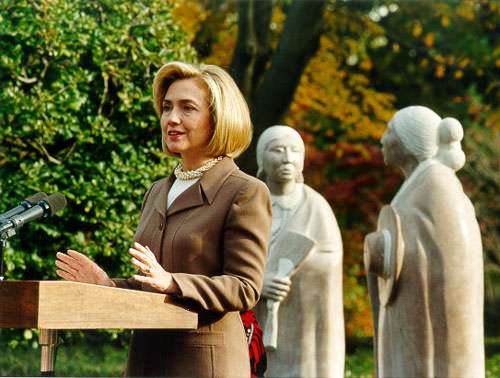Obamacare: It Could Be Worse
Hillarycare was tossed onto the ash heap of history-but it still had profound consequences.


Barack Obama was still a freshman in the Illinois state Senate in 1998, an era when the technologically advanced were dialing up the World Wide Web over 56k modems and Netscape Navigator. So you can understand why Democratic partisans have gotten a little shirty over the recent unearthing of notes by Diana Blair, a personal friend of Hillary Clinton, about Monica Lewinsky, and by Kentucky Sen. Rand Paul's recent efforts to re-litigate the Lewinsky scandal. It is, after all, pretty old news.
Then again, it's no older than Mitt Romney's tenure at Bain Capital—a subject that absolutely fascinated Democratic partisans not so long ago. It's certainly fresher news than Richard Nixon—yet when tapes released in 2010 revealed Nixon spouting nonsense about Jews, blacks, Italians, and others back in the 1970s, it was Big News. And Nixon wasn't even running for public office any longer in 2010 (I checked!).
This doesn't mean Paul ought to drag Bill Clinton's indiscretions back into public light. For one thing, Clinton isn't running for anything, either. For another—and Republicans probably have repressed their memories of this—Gallup reports that "as the Lewinsky situation unfolded, Clinton's job approval went up, not down, and his ratings remained high for the duration of the impeachment proceedings." These days the former president is such a beloved figure that bad-mouthing him for anything is like cussing out the Dalai Lama for not wearing a tux to a black-tie dinner: Even if you're technically right, you still lose.
Besides, Republicans are supposed to care about individual responsibility, and it's hard to see how Hillary was individually responsible for her husband acting like a hound dog. If Republicans want to rake her over some old coals, they have much better material to use: Hillarycare.
The ink was still drying on Bill Clinton's White House stationery in January 1993 when he created a special health care task force and put his wife in charge of it. The task force was supposed to do nothing less than transform the entire American health care system with a plan to guarantee universal coverage for all. And it was supposed to lower medical spending because, as Hillary Clinton put it a few months later, "too many people have made too much money" providing health care in the U.S.
Much about the task force was secret. It met in secret; its membership was secret; its deliberations were secret. And while it did meet with various health care stakeholders, the meetings were described by the chairman of Physicians for a National Health Program as "a magnificent exercise in pseudo-openness."
The task force was also gargantuan. As The New York Times reported, "with more than 500 people, the staff was bigger than 99 percent of all businesses in the United States."
That huge staff produced a huge bill: A 1,342-page proposal "of sweeping scope and complexity," as one academic journal later put it, that would have corralled all Americans into regional health cooperatives. The cooperatives were to negotiate with insurers, set standards for insurance coverage, collect premiums, negotiate with doctors and hospitals, regulate prices, and cap health care spending.
The plan would also have required every employer to provide health insurance for all employees; required every citizen to have insurance; and done it all through a health maintenance organization (HMO) model. Everything would be supervised by a seven-member National Health Board.
Reviews were less than glowing. "Under these plans, people are driven like cattle from doctor to doctor," said a Richmond-area doctor, who described the proposal as a "huge, megalithic" system. "Not since Franklin Roosevelt's War Production Board," said The Economist, "has it been suggested that so large a part of the American economy should suddenly be brought under government control."
Even some of those on the task force thought it was excessive. "I can think of parallels in wartime," read one internal memo released years later, "but I have trouble coming up with a precedent in our peacetime history for such broad and centralized control over a sector of the economy."
A huge public relations battle between supporters and opponents ensued. It ended in a rout. Hillarycare was tossed onto the ash heap of history—but it still had profound consequences. The next year, Republicans won control of both the House and Senate for the first time in four decades, in no small part on the strength of public reaction to Hillarycare.
When she ran for president against Obama a decade and a half later, Hillary rolled out a slightly more modest health care plan. This time she pitched it, very carefully, as the "American Health Choices Plan"—despite the fact that it reduced choices by mandating coverage, forbidding insurers to deny coverage, and imposing price controls. Yet as The Washington Post reported at the time, Clinton "emphasized that if people … currently like their health care plan, her proposal does not require them to change it." Sound familiar?
More Americans disapprove of Obamacare than approve of it. This has been the consistent finding since the law first took effect. It is not soothing to realize that, if Hillary Clinton had gotten her way, America now would be saddled with something even worse.
This column first appeared at the Richmond Times-Dispatch.


Show Comments (51)